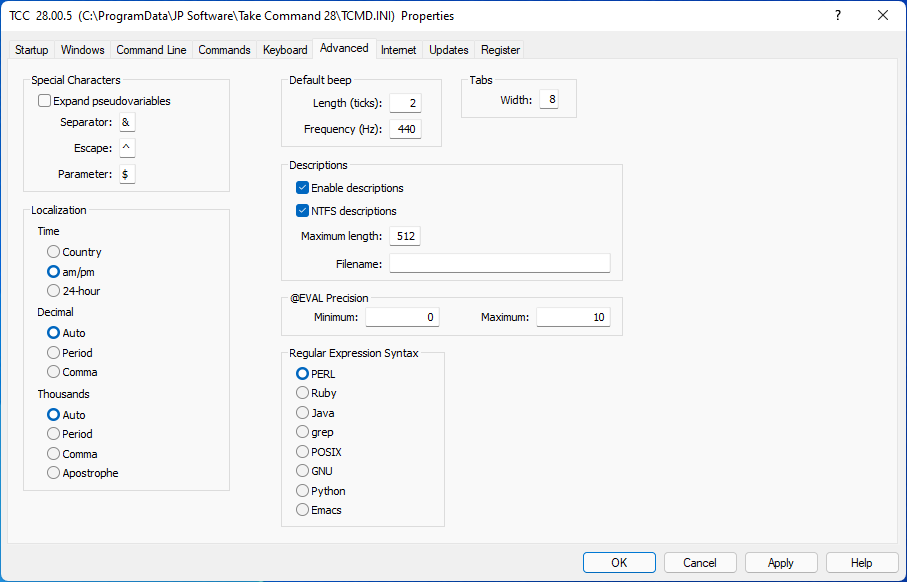Advanced
If you are not familiar with the purpose or use of the Advanced configuration dialog, review the main configuration dialogs topic before continuing.

Special Characters:
Separator : The character used to separate multiple commands on the same line. The default is an ampersand (&). It can be dynamically modified by the /C option of the SETDOS command. You cannot use any of the redirection characters (| > < ) or any of the white space characters (space, tab, comma, or equal sign).
Escape : The character used to suppress the normal meaning of the following character. The default is a caret (^). See Escape Character for a description of the special escape sequences. You cannot use any of the redirection characters (|, >, or < ) or the white space characters (space, tab, comma, or equal sign) as the escape character. See also: SETDOS /E.
Parameter : The character used after a percent sign to specify all or all remaining command line parameters in a batch file or alias (e.g., %$ or %n$; see Batch File Parameters and ALIAS). The default is the dollar sign [$]. See also: SETDOS /P.
Localization:
Time : The format of time displays in the output of the DATE, DIR, SELECT, TIME and TIMER commands, and in LOG files. It has no effect on %_TIME, %@MAKETIME, the $t and $T options of PROMPT, or date and time ranges.
| Country | Formats the time according to the country code set for your system. |
| am/pm | Displays the time in 12-hour format with a trailing "a" for AM or "p" for PM. |
| 24-hour | Display the time in 24-hour time format. |
Decimal : Sets the character used as the decimal separator for @EVAL, numeric IF and IFF tests, version numbers, and other similar uses. The only valid settings are period [.], comma [,], and Auto (the default). A setting of Auto tells TCC to use the decimal separator associated with your current country code. If you change the decimal character you will need to adjust the thousands character so that the two characters are different. See also: SETDOS /G.
Thousands : Sets the character used as the thousands separator for numeric output. The only valid settings are period [.], comma [,], and Auto (the default). Auto tells TCC to use the thousands separator associated with your current country code. If you change the thousands character you will need to adjust the decimal character so that the two characters are different. See also: SETDOS /G.
Default Beep:
Length : The default BEEP length in system clock ticks (approximately 1/18 of a second per tick). Also the default length for "error" beeps (for example, if you press an illegal key).
Frequency : The default frequency (in Hz) for the BEEP command. This is also the frequency for "error" beeps (for example, if you press an illegal key). To disable all error beeps set the frequency to 0. If you do, the BEEP command will still be operable, but will not produce sound unless you explicitly specify the frequency and duration.
You can play a system sound on an error by setting Length to 0 and Frequency to the desired sound:
| 0 | Windows default ("OK") beep sound |
| 16 | Windows Critical Stop ("Hand") sound |
| 32 | Windows Question sound |
| 48 | Windows Exclamation sound |
| 64 | Windows Asterisk sound |
Tabs:
Tabs : Sets the tab stops for LIST output. The allowable range is 1 to 32.
Descriptions:
Enable Descriptions : Set description handling for the file processing commands (COPY, DEL, MOVE, REN, etc.). If disabled, TCC will not update the description file when files are moved, copied, deleted or renamed. See also: SETDOS /D.
NTFS Descriptions : If set, TCC uses the Comments field in the NTFS SummaryInformation stream for each file to hold its description, instead of the DESCRIPT.ION file. The advantages are that the description will always remain with the file regardless of what program copies, moves, or renames it. The disadvantage is that you cannot attach a description to directories.
Maximum Length : Set the description length limit for DESCRIBE. The allowable range is 20 to 511 characters.
Filename : Sets the file name in which to store file descriptions. The default file name is DESCRIPT.ION. See also: SETDOS /D.
@EVAL Precision
Minimum : The minimum number of digits after the decimal point in values displayed by @EVAL. The allowable range is 0 to 1000. This directive will be ignored if Minimum is larger than Maximum. You can override this setting with the construct @EVAL[expression=n,n]. See also: SETDOS /F.
Maximum : The maximum number of digits after the decimal point in values displayed by @EVAL. You can override this setting with the construct @EVAL[expression=n,n]. The allowable range is 0 to 1000; if you use the "=n,n" syntax the maximum is 10,000. See also: SETDOS /F.
Regular Expression Syntax
Sets the type of regular expression syntax to use.
